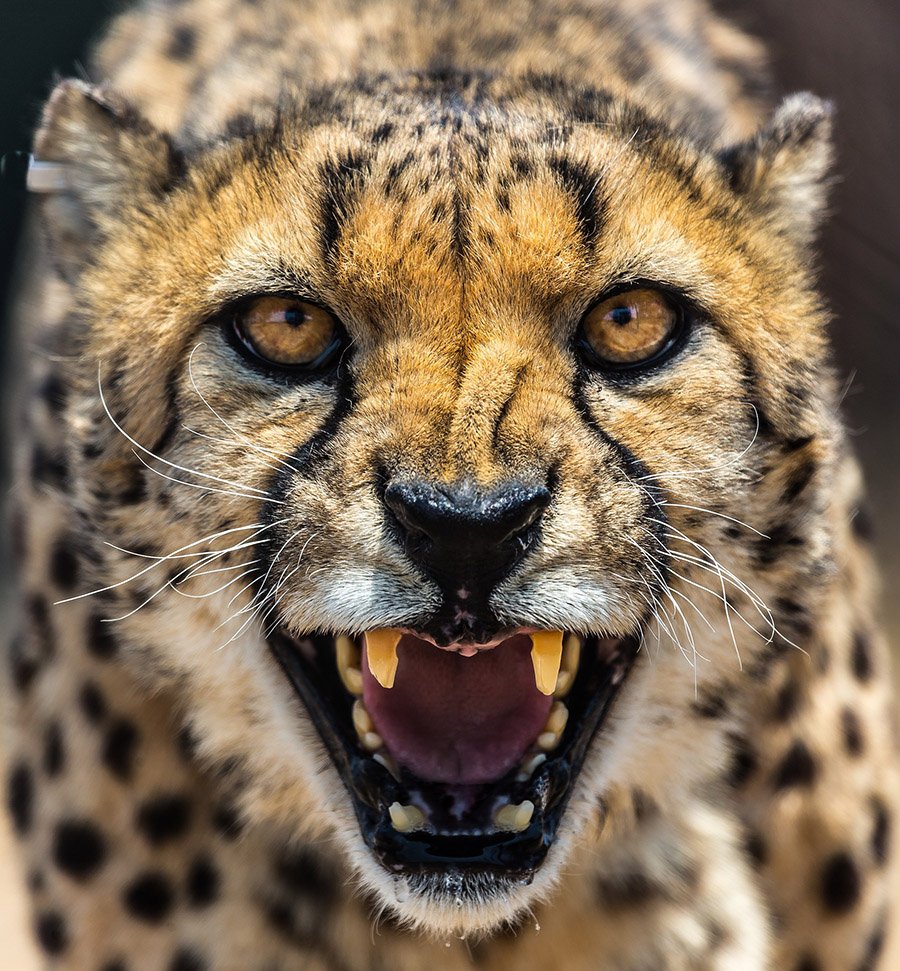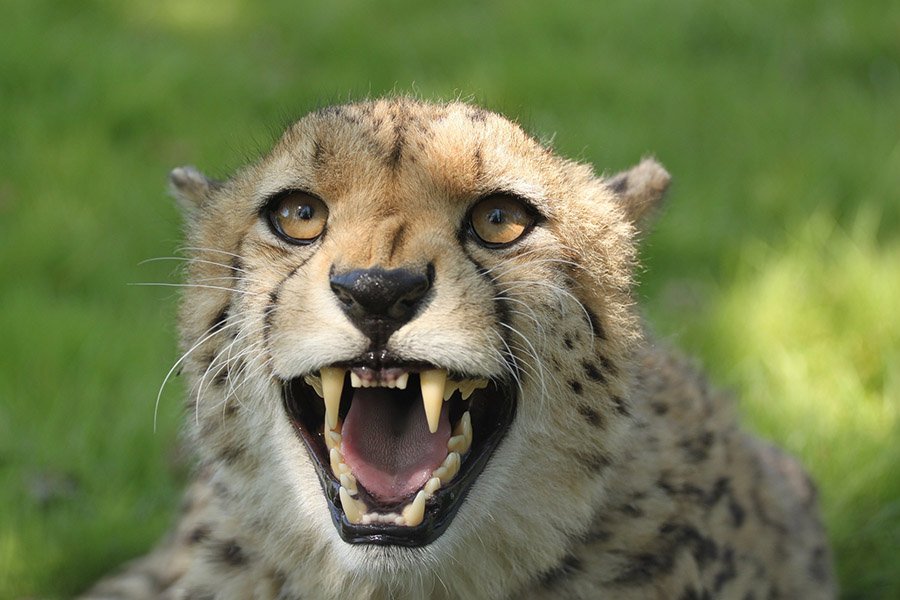Cheetahs are primarily known for their speed, as they are the fastest land animals globally. However, due to their reputation for being ferocious predators, many wonder whether cheetahs are dangerous or whether these felines attack and eat humans.
Therefore, the main objective of this article is to address these queries by examining the risks associated when a human encounters a cheetah and the necessary actions to minimize or eliminate any hostility that may lead to fatal consequences.
Do Cheetahs Attack People?
Cheetahs are generally not considered a major threat to humans since there are few confirmed cases where these cats have attacked and fed on human flesh.
However, the few reported incidents usually occur when they are provoked or threatened. For instance, when humans invade their territory or disturb them during feeding and mating.
Cheetahs are naturally wary of humans and tend to avoid confrontation whenever possible. It’s why injuries are minimal during such cases where these cats have attacked people, and fatalities are extremely rare.
Therefore, as long as humans respect and avoid the feline’s space/territory or behave responsibly around them (while in captivity), the chances of the cat being hostile and attacking them are minimal.
Also read: Can Cheetahs Climb Trees?
Are Cheetahs Aggressive?
These felines are not considered to be aggressive. They are solitary animals and quite shy; hence, they avoid unnecessary confrontations whenever possible.
However, like all cat species, they become aggressive if they feel threatened or when their territory is invaded. It tends to spark their self-defense senses to either attack the intruder or flee for safety.

They are more likely to flee than fight when faced with an enemy that seems more dangerous or significantly bigger than them. They rely on their incredible speed and agility to escape such threats (mainly from predators like lions) to avoid a fight that they highly sense they’ll lose.
People need to give these big cats plenty of space and avoid approaching them too closely, mainly if they have cubs or seem agitated/stressed. It’s because, according to their perception, a human is not strong enough to make it flee for safety; hence its preferred option will be attacking this perceived enemy.
Therefore, we must understand that cheetahs can exhibit aggressive behavior under specific situations, even though they are more likely to avoid conflict than initiate it.
Also read: What Eats Cheetahs? Their Top 5 Predators
Do Cheetahs Eat Humans?
Generally, cheetahs do not eat humans. Instead, these felines feed on small to medium-sized prey, like gazelles, impalas, wild rabbits, and young wild beasts. They are not adapted to prey on humans, and there are very few recorded instances of cheetahs hunting or eating humans to consider them man-eaters.
In rare cases where cheetahs have attacked humans, it typically results from the creatures feeling threatened or provoked by humans. These incidents are generally isolated and do not reflect a pattern of cheetahs actively seeking out humans as prey.
While it’s always important to exercise caution when close to wild animals, the risk of being attacked or eaten by a cheetah is minimal.

How to Survive a Cheetah Attack?
In case you find yourself in a situation where a cheetah is being aggressive or has attacked you, below are five steps to apply to increase your chances of survival:
- Be Calm And Don’t Panic: Try to maintain a steady pace and avoid sudden movements that might startle the cheetah.
- Give The Cheetah Plenty of Space: Back away slowly and try to create as much distance between yourself and the creature as possible.
- Don’t Turn Your Back on The Cat: As you move further away from the feline, calmly maintain eye contact with the cheetah at all times. Avoid turning your back and running away immediately as it may assume this action as hostile or consider you as potential prey.
- Make Yourself Appear As Large and Strong As Possible: It is essential to note that this strategy is best applied when there is a reasonable distance between you and the cheetah. You can raise your arms above your head, shout, and wave any available objects (such as a jacket or backpack) to make yourself appear more powerful and large so as to scare it.
- Use Whatever You Have: It’s the last option to be applied when the feline attacks you. Use whatever object you have to defend yourself.
It may include rocks, sticks, an umbrella, or any other useful object within your reach. At this point, you are fighting for your survival, so it doesn’t matter what it is as long as it’s useful.
Also read: How High Can a Cheetah Jump?
Can a Cheetah Kill a Human?
Yes, a cheetah can easily kill a human. The big cat has sharp claws and canine teeth capable of inflicting fatal injuries and killing humans.
The cat’s speed and ferociousness are other factors that make it highly dangerous, especially if it considers the person a significant threat to its territory, offspring/cubs, meal, or overall survival.
Frequently Asked Questions
How Often Do Cheetahs Eat?
In the wild, they typically eat once every two to five days, depending on the prey availability, the target size, and the individual age and sex. In captivity, cheetahs are typically fed once or twice a day, depending on the animal’s needs and the recommendations of their caretakers.
However, they are also adapted to going without food for extended periods if necessary. They have a lower metabolic rate than other large carnivores, allowing them to survive on less food and water.
What Do Cheetahs Eat in The Wild?
Cheetahs are carnivores and primarily eat small to mild-hooved animals, such as gazelles, impalas, and springboks. They may also prey on smaller mammals such as hares, birds, and occasionally smaller predators like jackals.
Since they are not as strong as other big cats, like lions and tigers, they often eat quickly by consuming as much flesh as possible before other predators arrive.
Do Cheetahs Only Attack Prey That Runs?
No, cheetahs don’t only ambush prey that runs; since they are opportunistic hunters. It means they always take advantage of any available prey they can catch, regardless of size and speed.
However, they are not scavengers meaning they don’t feed on decomposing flesh or carcasses that have been dead for a long time, not more than 24 hours.
Final Thoughts
Compared to other felines, such as lions with a reputation for being man-eaters, cheetahs are not considered a threat to humans in terms of attacking and eating them. However, it’s essential to exercise caution and respect all cheetahs, whether in captivity or in the wild.
Although they might not be man-eaters, you can be certain that if you invade their personal space/territory or make them feel insecure/threatened, they will do what they can to defend themselves, including severely injuring or killing their perceived enemy.
Other Articles to Learn More About Cheetahs
- Cheetah: Characteristics, Diet, Facts & More [Fact Sheet]
- Cheetah vs. Jaguar: Key Differences & Who Would Win a Fight?
- How Many Spots Does a Cheetah Have? Are There Spotless Cheetahs?
- Cheetah vs. Leopard: Key Differences and Who Would Win a Fight?
- Cheetah Sounds: What Sounds Do Cheetahs Make, Why and When?
- How Strong is a Cheetah? How Do They Compare With Other Big Cats?
- How Many Types of Cheetahs Are There? A Look at Their Different Subspecies
- Are Cheetahs Friendly? Can They Be Pets?
